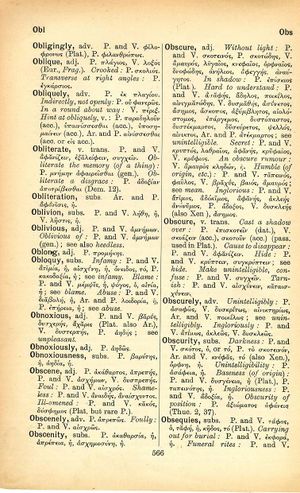obliterate: Difference between revisions
From LSJ
νόησε δὲ δῖος Ὀδυσσεὺς σαίνοντάς τε κύνας, περί τε κτύπος ἦλθε ποδοῖιν → godly Odysseus heard the fawning of dogs, and on top of that came the beat of two feet
(Woodhouse 4) |
(CSV4) |
||
| Line 1: | Line 1: | ||
{{ | {{Woodhouse1 | ||
| | |Text=[[File:woodhouse_566.jpg|thumb|link={{filepath:woodhouse_566.jpg}}]]'''v. trans.''' | ||
P. and V. [[ἀφανίζω|ἀφανίζειν]], [[ἐξαλείφω|ἐξαλείφειν]], συγχεῖν. | |||
<b class="b2">Obliterate the memory</b> (<b class="b2">of a thing</b>): P. μνήμην ἀφαιρεῖσθαι (gen.). | |||
<b class="b2">Obliterate a disgrace</b>: P. ἀδοξίαν ἀποτρίβεσθαι (Dem. 12). | |||
}} | }} | ||
Revision as of 09:47, 21 July 2017
English > Greek (Woodhouse)
v. trans.
P. and V. ἀφανίζειν, ἐξαλείφειν, συγχεῖν. Obliterate the memory (of a thing): P. μνήμην ἀφαιρεῖσθαι (gen.). Obliterate a disgrace: P. ἀδοξίαν ἀποτρίβεσθαι (Dem. 12).

